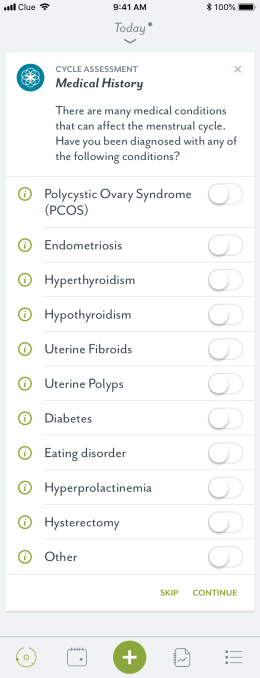Period app Clue hopes to find out if you have PCOS
Clue, an app built on machine learning to track a woman’s monthly menstrual cycle, has been paying close attention lately to those with irregular periods. The Berlin-based company hopes to identify what may be causing those irregular cycles and then calculate a woman’s risk of polycystic ovarian syndrome (PCOS) in order to get her the help she needs from a medical provider.
For those who don’t know, PCOS is a sometimes painful disease that can put a woman at risk of infertility, diabetes, cardiovascular disease and endometriosis, among other issues. The most common indicator a woman has PCOS is an unpredictable cycle, showing up whenever it wants and making it difficult to plan around.
 Those using the app will be able to get insight on what’s going on and why their period doesn’t always come on time using the newly launched ‘Irregular Cycles’ feature within the app.
Those using the app will be able to get insight on what’s going on and why their period doesn’t always come on time using the newly launched ‘Irregular Cycles’ feature within the app.
A few other apps also have a built-in irregular cycles tracking feature. One (on the nose) app called Period Tracker, which can be found in both the App Store and Google Play is specifically designed to track irregular cycles. Another app from Planned Parenthood called Spot On is geared more towards teens and is intended to help them track how their period changes over time. But there doesn’t seem to be much in the way of identifying PCOS or gathering data on what may be causing these irregular cycles from these other apps.
According to Clue, its newly released tool uses a combination questionnaire and “dynamic Bayesian network” to come up with the most useful questions and then pinpoint whether users may be able to blame PCOS for their cycle woes.
But not just anyone can access this feature — it’s only for those Clue recognizes as having clinically irregular or unpredictable cycles and are not on birth control. So if you’re just curious but have a predictable as rain period, this is not the feature for you.
Clue already rolled out the feature to a test group of users with some success. “Of the users that received an assessment of potential PCOS, a significant portion reported visiting a healthcare professional for diagnosis within a month of the assessment,” Clue founder Ida Tin told TechCrunch. “Along with collaborator Dr. Shruthi Mahalingaiah, we plan to dive deeper into the data to see what additional patterns can be uncovered and where we can provide more benefit to our users.”
Often PCOS comes up as a cause of inability to conceive, with the majority (80%, according the the National Institute of Health) of infertility attributed to this disease. But even those with regular cycles aren’t necessarily ovulating (dropping an egg to be fertilized in the womb) each and every month.
Tin hopes the data she and her team gleans from the new in-app feature will help users better predict health issues affecting ovulation and their cycle in general.
“A change, particularly when sudden, in one’s own usual cycle length pattern may be indicative of a health matter deserving of attention,” she told TechCrunch. “For example, if a person typically has cycles 26-32 days in length and suddenly starts having cycles 20-25 days in length, then it is worth seeing a health care provider.”
No comments: